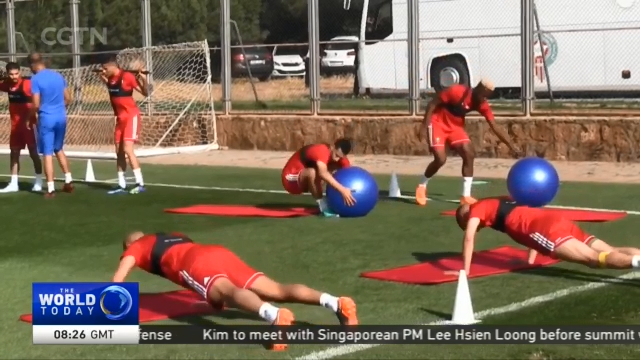
16:45, 10-Jun-2018
2018 FIFA World Cup: Arab teams balance tough training and Ramadhan fast
03:16

Six Islamic nations are set to compete in the World Cup next week. The players have had to endure tough training, while at the same time, observing the holy month of Ramadhan. CGTN's Adel EL Mahrouky reports about how some teams have been coping.
In the holy month of Ramadan, from sunrise to sunset, Muslims fast every day. That's an average of 16 hours without eating or drinking. For national teams who are preparing for their appearance in the World Cup next week, it's an huge challenge.
FEDA SHATLEH NUTRITIONIST "When fasting for 8-10 hours, Glucogen levels in the body decrease. Fats turn into glucose or energy which athletes burn during their training. This could pose risks to their health, because after this substance burns all the body fat, it starts sucking protein from the muscles, there is also a huge risk of dehydration."
Because of that health risk, and by perceiving the World Cup as a patriotic duty, some Islamic preachers have exempted football players from fasting. Most players however are choosing to preserve the Ramadan spirit, which has driven national teams to approach the issue differently.
MOHAMED YOUSRY SPORTS ANALYST "The Saudis have taken advantage of the fasting exemption some clerks have given them. Egypt, Tunisia and Morocco have decided to keep on fasting, forcing the coaching teams to hire nutritionists who specialize in Ramadan diets. With approval from their coaches they moved the trainings to night time when Muslims are allowed to Eat."
FEDA SHATLEH NUTRITIONIST "The timing of the training is very critical for players. The best time to train is 45 minutes before breaking the fast. When players eat right after they train, they give their bodies the nutrients they need. The second time is 2.5 hours after eating. Players must drink lots of fluids, and divide their meals before the fasting restarts into 4 or 5 small meals."
Time though is not enough; the duration of the non-fasting time is only 7 hours. Despite all of the planning and time invested in the Ramadan diet, players have invented their own tricks to survive the friendlies planned for their World Cup preparations.
MOHAMED YOUSRY SPORTS ANALYST "We've seen Tunisians during their friendlies. When time comes for players to break fast, the goal keepers falls down, pretending to faint in the middle of the match forcing the game to take a break. Players then rush to have some water and a quick snack."
Overall, Arab teams have not been in top form during these friendlies. The Ramadan Fast definitely has an impact on the Muslim teams. Yet that influence is not expected to last beyond their first matches. Russia 2018's opening ceremony will be held the day before Ramadan ends. AMA CGTN CA.

SITEMAP
Copyright © 2018 CGTN. Beijing ICP prepared NO.16065310-3
Copyright © 2018 CGTN. Beijing ICP prepared NO.16065310-3